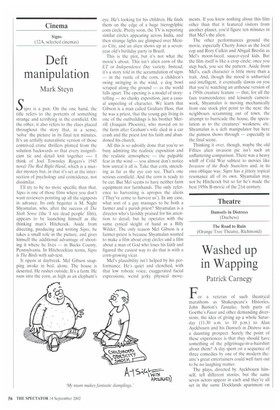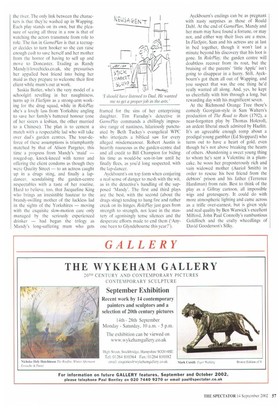Theatre
Damsels in Distress (Duchess) The Road to Ruin (Orange Tree Theatre, Richmond)
Washed up in Wapping
Patrick Camegy
For a veteran of such theatrical marathons as Shakespeare's Histories, John Barton's Tantalus, both parts of Goethe's Faust and other demanding diversions, the idea of giving up a whole Saturday (11.30 a.m. to 10 p.m.) to Alan Ayckbourn and his Damsels in Distress was a daunting prospect. Surely the point of these experiences is that they should have something of the pilgrimage-in-a-hairshirt about them? A day spent on a sequence of three comedies by one of the modern theatre's great entertainers could well turn out to be no laughing matter.
The plays, directed by Ayekbourn himself, tell different stories, but the same seven actors appear in each and they're all set in the same Docklands apartment on the river. The only link between the characters is that they're washed up in Wapping. Each play stands on its own, but the pleasure of seeing all three in a row is that of watching the actors transmute from role to role. The fun in GamePlan is that a teenager decides to turn hooker so she can raise enough cash to save herself and her mother from the horror of having to sell up and move to Doncaster. Trading as Randy Mandy@lovechicks.co.uk, she pressurises her appalled best friend into being her maid as they prepare to welcome their first client while mum's out at work.
Saskia Butler, who's the very model of a schoolgirl revelling in her naughtiness, turns up in FlatSpin as a strong-arm working for the drug squad, while in RolePlay she's a lovely lass from Yorkshire angling to save her family's battered honour (one of her sisters a lesbian, the other married to a Chinese). The plan is to cement a match with a respectable lad who will take over dad's garden centres. The tour-deforce of these assumptions is triumphantly matched by that of Alison Pargeter, this time a progress from Mandy's 'maid' — rouged-up, knock-kneed with terror and offering the client condoms as though they were Quality Street — to an actress caught up in a drugs sting, and finally a lapdancer, scandalising the garden-centre respectables with a taste of her routine. Hard to believe, too, that Jacqueline King who brings an irresistible hauteur to the brandy-swilling mother of the luckless lad in the sights of the Yorkshires — moving with the exquisite slow-motion care only managed by the seriously experienced drinker — had begun the trilogy as Mandy's long-suffering mum who gets framed for the sins of her enterprising daughter. Tim Faraday's detective in GarnePlay commands a chillingly impressive range of nastiness, hilariously punctuated by Beth Tuckey's evangelical WPC who interjects a biblical saw for every alleged misdemeanour. Robert Austin is heartily nauseous as the garden-centre dad and all credit to Bill Champion for biding his time as would-be son-in-law until he finally flees, as you'd long suspected, with the lap-dancer.
Ayckbourn's on top form when conjuring a real sense of danger to mesh with the wit, as in the detective's handling of the supposed 'Mandy'. The first and third plays are the best, with the second (about the drugs sting) tending to hang fire and rather creak on its hinges. RolePlay just goes from strength to strength, not least in the mastery of agonisingly tense silences and the desperate efforts made to end them (`Anyone been to Glyndebourne this year?').
Ayckbourn's endings can be as pregnant with nasty surprises as those of Roald Dahl. At the end of GarnePlan. Mandy and her mum may have found a fortune, or may not, and either way their lives are a mess. In FlatSpin, Sam and his actress are at last in bed together, though it won't last a minute beyond his discovery that his loot is gone. in RolePlay, the garden centre will doubtless recover from its rout, but the bruising of the parents' little Apple' isn't going to disappear in a hurry. Still, Ayckbourn's got them all out of Wapping, and you suspect that was the one thing he'd really wanted all along. And, yes, he kept us cheerfully with him through a long, but rewarding day with his magnificent seven.
At the Richmond Orange Tree there's comedy Georgian-style in Sam Walters's production of The Road to Ruin (1792), a near-forgotten play by Thomas Holcroft, an ardent liberal much admired by Hazlitt. It's an agreeable enough romp about a prodigal young gambler (Ed Stoppard) who turns out to have a heart of gold, even though he's not above breaking the hearts of others. Abandoning a sweet young thing to whom he's sent a Valentine in a plumcake, he woos her preposterously rich and vain widowed mother (Auriol Smith) in order to rescue his best friend from the debtors' prison and his father (Terrence Hardiman) from ruin. Best to think of the play as a Gillray cartoon, all impossible wigs and grotesquery. It could do with more atmospheric lighting and came across as a trifle over-earnest, but is given style and real quality by Ben Warwick's excellent Milford, John Paul Connolly's rumbustious Goldfinch and the crafty wheedlings of David Gooderson's Silky.











































































 Previous page
Previous page